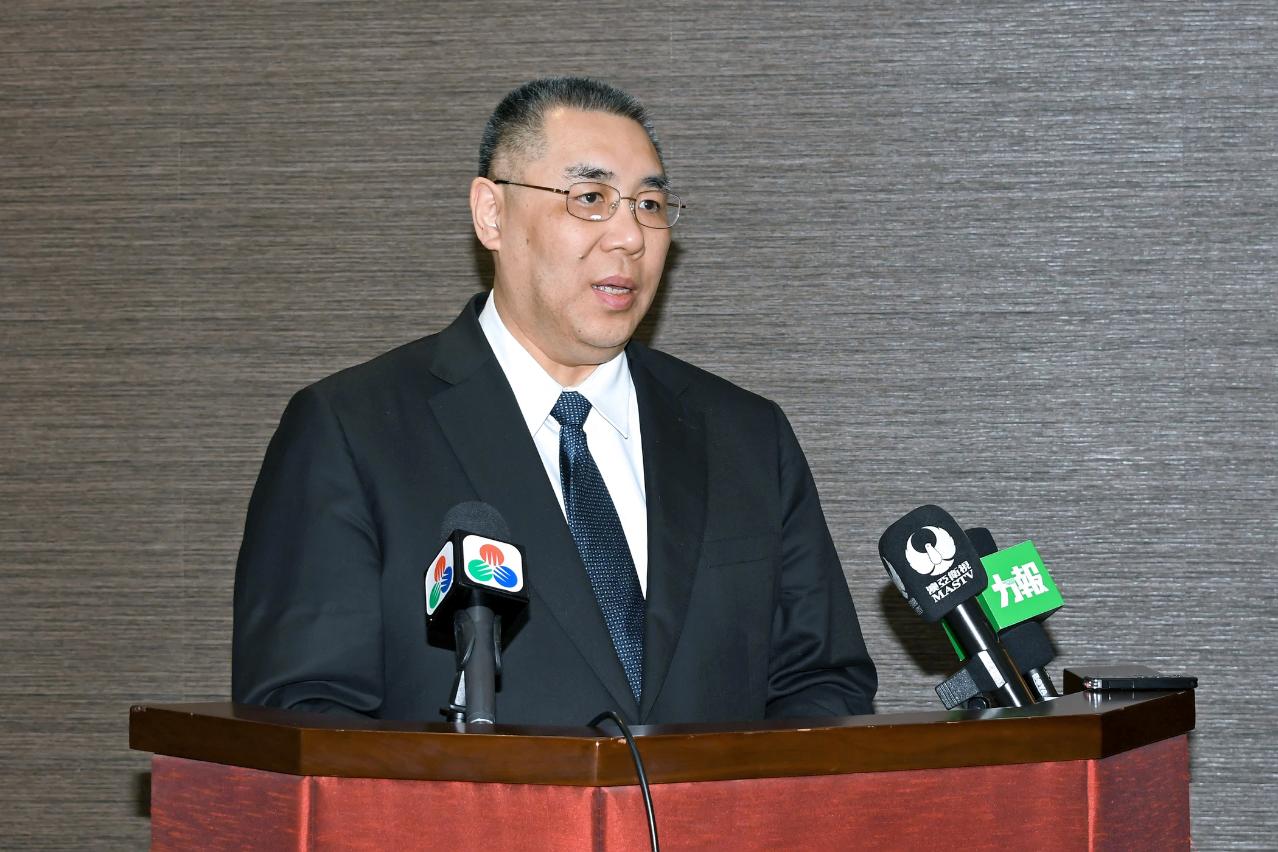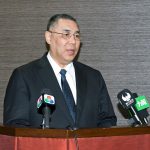 The Chief Executive, Mr Chui Sai On, briefs reporters in Beijing.
The Chief Executive, Mr Chui Sai On, briefs reporters in Beijing.
President Xi Jinping praised Macao’s role in the country’s reform and opening up process over the past 40 years, while outlining four aspirations for Macao to contribute further to national development, the Chief Executive, Mr Chui Sai On, told reporters in Beijing.
President Xi gave an important speech this morning while hosting, respectively, Hong Kong and Macao delegations in the capital to celebrate the 40th anniversary of the country’s reform and opening up process.
During today’s meeting – held at the Great Hall of the People – President Xi detailed four aspirations to further integrate the development of Hong Kong and Macao with the overall national development, in order to jointly usher in a new era of progress and prosperity.
Vice Premier of the State Council Mr Han Zheng also attended the meeting. Delivering speeches at the meeting were: Mr Chui; the Chief Executive of the Hong Kong Special Administrative Region (SAR), Mrs Lam Cheng Yuet-ngor; and some other members of the two delegations.
In the afternoon, Mr Chui met with reporters in Beijing, making a brief presentation on the outcome of his three-day tour to the capital.
Macao had been unremitted in serving the country’s development needs, while delivering on its unique strengths, said Mr Chui. These principles would continue to guide Macao’s endeavour to contribute to the country’s reform and opening up process.
Mr Chui shared with reporters the four aspirations outlined for Macao and Hong Kong by President Xi during today’s meeting. In his comments to the media, the Chief Executive focused on the parts of President Xi’s message related to Macao.
First, Macao should play a more active role in the reform and opening up process of the country. President Xi said he hoped Macao – via further contributions relating to financial capital, technology and talent – would deepen its role and expand its functions in the country’s new round of policies to open up further the nation’s economy.
Second, Macao should diligently integrate its development with the country’s overall progress, envisaged as a responsibility of the SAR under the “One country, two systems” principle. President Xi called for further effort to draft innovative development mechanisms for Macao and to give full play to the city’s unique advantages, in order to create new drivers for economic growth.
Third, Macao should make greater contributions to the country’s governance system. President Xi advised Macao to keep optimising the implementation of the country’s Constitution and of the SAR’s Basic Law, under the “One country, two systems” principle. Meanwhile, Macao should also continue to enhance the quality of its administration.
Fourth, Macao should facilitate people-to-people exchanges at an international level. Macao has unique characteristics as an international city, which provide favourable conditions to promote Chinese culture, and Macao’s example as a role model in the successful implementation of the “One country, two systems” principle.
In the press briefing, Mr Chui highlighted the significance of Macao’s bridging roles, in terms of the city’s close ties with the Portuguese-speaking countries and of its cooperation efforts with several provinces and regions on the mainland.
Looking forward, the Macao SAR Government would spare no effort in speeding up the implementation of Macao’s strategic goals, namely of being a world centre of tourism and leisure and a commercial and trade cooperationservice platform between China and Portuguese-speaking countries (collectively known as the “Centre and Platform” policies), Mr Chui said.
The Chief Executive led a Macao delegation to Beijing from 10 to 12 November, to attend a number of activities organised by various sectors from Hong Kong and Macao. Such activities aimed to celebrate the 40th anniversary of the country’s reform and opening up.
While in the capital, the delegation attended a seminar to review the participation of the two SARs in the country’s reform and opening up process over the past 40 years. The seminar also covered the SARs’ ongoing integration with national development.
In the seminar, Mr Chui stated that Macao was both an active participant in, and a beneficiary of, the country’s opening up process. He added that the SAR would continue to seize the unprecedented opportunities created by major national development strategies.
The Macao delegation also visited the Palace Museum in Beijing.
The Macao delegation was comprised of about 50 members, including principal officials of the Government, and sectorial representatives that have contributed to the progress of the country’s reform and to Macao’s development.
Members of the Macao delegation included: the President of the Legislative Assembly, Mr Ho Iat Seng; the Secretary for Economy and Finance, Mr Leong Vai Tac; the Secretary for Security, Mr Wong Sio Chak; and Deputy Directors of the Liaison Office of the Central People’s Government in the Macao SAR, Mr Zhang Rongshun and Mr Xue Xiaofeng.


